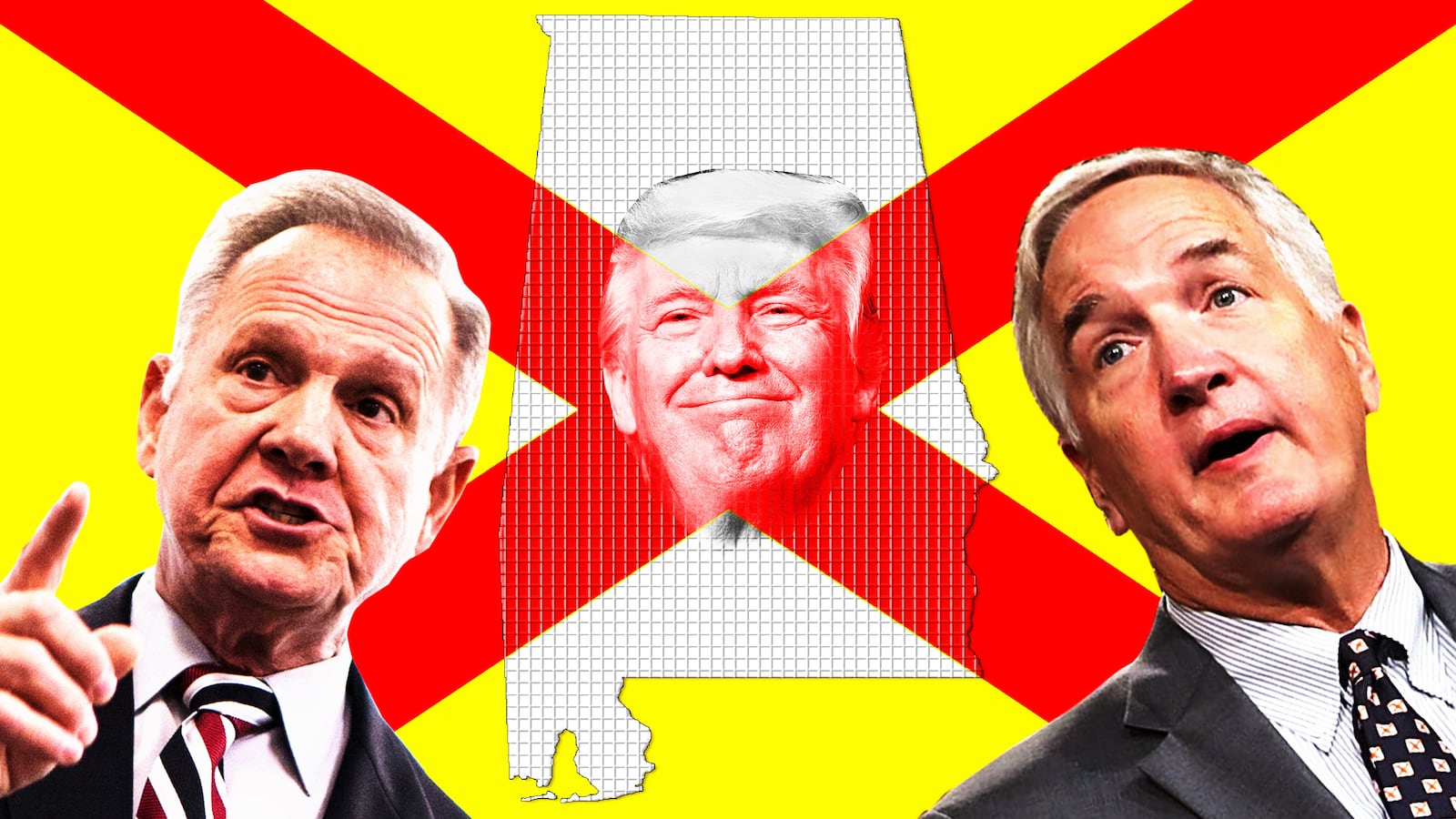With Donald Trump and some of his major boosters split on a key Alabama Senate contest this week, die-hard supporters are attempting to turn the race into a referendum on how the president should conduct the rest of his term in office.
The Alabama Senate contest pits Trump, who has endorsed incumbent Republican Sen. Luther Strange, against the nationalist-populist political faction that comprised his base last year. That faction is backing former state Supreme Court Justice Roy Moore. And the extent to which they will absolve Trump for getting on board with Strange or view it as a heresy will provide the clearest indication to date about the nature and extent of the president’s support.
At the helm of the pro-Moore effort is the political faction led by former White House chief strategist Steve Bannon and Breitbart News, the pro-Trump website to which Bannon returned after his departure from the White House last month. Breitbart has zeroed in on Strange as its top target, and sent multiple reporters to Alabama to monitor developments in the race.
According to one source close to Bannon, the special election will not just be a test of Trumpism as a political movement but potentially re-define Trumpism itself.
“Is this a cult of personality around one person, or is this a movement that has ideas, beliefs, a value structure, and the political will and the muscle to see those values implemented in elections?” the source said, explaining the election’s stakes for the larger populist-nationalist political project.
As much as any prior time in his presidency, the Alabama Senate race has exposed the political divisions within the Trump orbit. Each candidate in the race has an overtly pro-Trump independent political group supporting him. For Strange, it’s America First Policies and its super PAC arm, America First Action. Former Trump campaign digital director Brad Parscale formed America First shortly after the election, and the groups have brought on prominent Trump-world names such as Corey Lewandowski, the president’s former campaign manager, and Katrina Pierson, a former Trump campaign spokesperson.
America First Action jumped into the Alabama race in August, dropping $155,000 on digital ads supporting Strange. Then last week, its dark money arm bought another $150,000 in pro-Strange digital ads and spent another $300,000 on phone banking and mailers supporting the incumbent.
On the other side is Great America Alliance, which co-sponsored the Montgomery rally at which Gorka and former Alaska Gov. Sarah Palin appeared. Founded by Republican political operative Eric Beach, the group has made recent high-profile hires such as conservative commentator Tomi Lahren and Andy Surabian, who was Bannon’s top political adviser in the White House.
Great America has spent less in the race. Its super PAC arm has reported just $20,000 in independent expenditures—payments for “voter contact” supporting Moore. The dark money arm reported about $150,000 in independent expenditures on the race, one of which paid for a coach bus that initially misspelled the name of its pro-Moore website.
The same divide between those two groups is visible within Trump’s administration itself. In a remarkable political break with the president, Trump’s own Housing and Urban Development secretary, Dr. Ben Carson, more-or-less threw his support behind Moore in a statement on Friday. That came shortly after a pro-Moore rally in Montgomery where Sebastian Gorka, until recently a White House national security adviser, lent his support to Moore’s campaign.
Publicly, aides and officials downplay the fault lines that have developed in Trump-land over the GOP primary fight. Privately, they view the outcome as key to guiding the next few years of the administration. As the Republican source put it: Those backing Moore are advancing “the agenda the president campaigned on in 2016,” while those behind Strange represent “the agenda of White House staff who are whispering in [Trump’s] ear.”
The divide isn’t between any pair of outside spenders in the race, the source added. “I think it’s bigger than any of these two groups.”
How Trump and supportive organizations ended up in this conflict says more about the president than the primary itself. Though Trump channeled the populist-nationalist cause to win the White House last year, he is by all accounts not a highly ideological person. So when he backed Strange, groups felt comfortable enough to break with him.
For many, the target is not so much Strange himself but Senate Majority Leader Mitch McConnell (R-KY) and the GOP establishment he represents. Even those who disagree on the significance of the divisions among pro-Trump groups in Alabama say the Republican Senate leader has defined the race.
“Luther Strange is suffering politically to a very large degree from the very legitimate impression that he is a tool of the Washington leadership,” said Quin Hillyer, a conservative columnist and former Republican candidate in 2013 special election for an Alabama House seat. “The idea that Mitch McConnell and his people bullied other candidates and consultants out of the race on Strange’s behalf and spent and raised 10 million or so on his behalf, it’s widely known and horrendously resented.
Breitbart too has made that point. Though the site has stepped up attacks on Strange as of late, it has taken particular editorial degree in making life more miserable for McConnell. One source close to Bannon declared that “certain elements of the swamp have aligned behind Strange” knowing that “he will do what the swamp and Mitch McConnell need.” That source didn’t fault America First for backing Trump’s preferred candidate, or Trump for backing Strange, but noted that Alabama will test the power of McConnell’s political machine, which, through groups such as the Senate Leadership Fund, have put up significant sums to keep Strange in his seat.
Whether Trump’s endorsement is enough to carry Strange over the finish line is anything but a settled issue, Hillyer said. “When it comes to transferring political popularity to others, Donald Trump will prove again to be an impotent loser,” he predicted.






